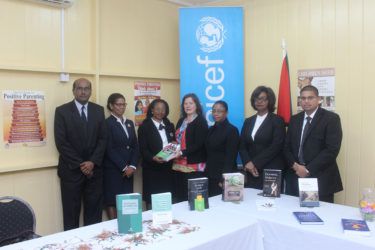Acting Chancellor Justice Yonette Cummings-Edwards on Friday received 23 legal books for the Family Court, donated by UNICEF in support of the advancement of the Family Court.
Handing over the law books, UNICEF Represen-tative for Guyana and Suriname Sylvie Fouet noted that supporting the development of the Family Court has been on the agenda of the Committee on the Rights of the Child since 2004.
Reiterating UNICEF’s commitment to advancing access to justice for children, Fouet said that during this year the organisation will also support efforts to develop a Youth Court as well as actions for the implementation of both the Sexual Offences Act and the Domestic Violence Act. “The justice system can (and must) respond in an equitable and non-discriminatory manner to the concerns of children and women,” she said.

Congratulating all those who have worked hard to make the Family Court a reality, she added, “I encourage you to strengthen your capacity to ensure that the public will have greater confidence in the system and its ability to address legal concerns, ensuring the welfare of the family and the best interests of the child.
“I also encourage you to ensure that the Family Court maintains the best practices and becomes a place where the rest of the Caribbean (and the world) can learn.
“UNICEF is committed to partnering with you on this journey. We look forward to continuing together to advance safety and justice for all children in Guyana.”
Justice Cummings-Edwards, thanking the organisation for its timely contribution, said the texts have captured the recent developments, cases, conventions on the rights of the child, conventions on human rights and all pieces of legislation that impact in some way in family law.
She said she hoped Guyana’s family court can be a model for other courts in the Caribbean.
Family Court Judge Dawn Gregory, in her remarks, told the gathering that while many of the same texts were used during studies, those donated by UNICEF are updated volumes.
She said the law books will assist colleagues, lawyers and litigants who would be able to access them in the court’s library.
The 23 legal texts are worth an estimated $1 million.








